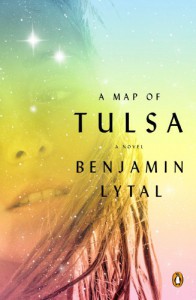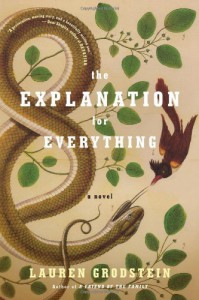ellaminnowpea
 My first job out of school was as a temp, writing product descriptions for the website of a company that sold scientific equipment to labs and schools and the like. I hated it. But I had a coworker who made the time there a lot more fun because he was a whackadoodle kind of guy. When he wasn't writing about beakers and syringes for this company, he was writing plays. He gave me one of his plays to read and, though I can't remember all of the details, it featured two characters that spent a lot of time discussing the rules of time travel as represented in various movies.
My first job out of school was as a temp, writing product descriptions for the website of a company that sold scientific equipment to labs and schools and the like. I hated it. But I had a coworker who made the time there a lot more fun because he was a whackadoodle kind of guy. When he wasn't writing about beakers and syringes for this company, he was writing plays. He gave me one of his plays to read and, though I can't remember all of the details, it featured two characters that spent a lot of time discussing the rules of time travel as represented in various movies. That was probably the first time in my life that I ever really thought about the logic of time travel.
I mean, I've read some time travel books and watched some time travel movies and television shows before. I've just never put a lot of thought into the rules of how it works, you know?
This book is about Nick, a man who was about to be killed in battle in 1812 but suddenly finds that he has been transported to 2003 instead. He is met in the future by a representative of The Guild, a shadowy organization that supports people who have been transported through time. Nick's been set up with a new life as a dairy farmer in the future, having been versed in enough science and pop culture to pass as something other than a nineteenth century aristocrat. Meanwhile, back in 1815, his former neighbor Julia's grandfather has died and her spiteful cousin is taking over his earldom. Julia unknowingly holds the secret to time travel in the form of a Talisman left behind by her grandfather, and Nick is sent back in time to find the Talisman.
I think fans of time travel and steampunkish things will like this a lot more than I did, and I'd very much recommend checking this out if you are one of those folks. It seemed a bit like what The Night Circus tried to be mixed with The Time Traveler's Wife, combining romance, intrigue, and supernatural elements. I think the book was actually pretty good -- better than my three-star level of enjoyment might suggest -- but two things kept me from really getting into it: the emotions-as-time-travel-tool (I'm sorry, that seemed kind of cheesy to me) and the fact that the historical scenes felt very anachronistic. Still, I think the book was wonderfully imaginative and the love story was actually interesting -- no insta-love here!
 I say this all the time, but I am sucker for a good coming-of-age tale. Give a kid a difficult time that forces him or her to deal with things too quickly, set it in the recent past, and I readily present my heartstrings for you to tug at will.
I say this all the time, but I am sucker for a good coming-of-age tale. Give a kid a difficult time that forces him or her to deal with things too quickly, set it in the recent past, and I readily present my heartstrings for you to tug at will. This book has all of those elements: By the time he's eleven, Fin has lost his father, mother, and grandparents. His legal guardianship falls to his twentysomething half-sister, Lady, who hasn't really been part of his life before, aside from a trip his family took nine years earlier to follow Lady to Italy after she ran out on her own wedding. Now Fin finds himself uprooted from the Connecticut farm he's always called home and transplanted into Greenwich Village.
The plot sounds tailor-made for the tugging of my heart's strings, right? So why only three stars? Well, the truth is that I liked this book for the most part. Fin was a great character, and the writing was very strong. However, there are a couple reasons that this book didn't connect with me more: the fact that I never really got a sense of the time and place, the fact that I didn't understand why any of the men continued to pursue Lady, and the awkward narration.
This book takes place in Greenwich Village in the mid-sixties, but I never really got a sense of the turbulence of the times aside from a few throw-away references. I often forgot that it wasn't a contemporary story, because so many of the cultural shifts that were happening didn't seem to have much effect of Fin. I think there was a lot of missed opportunity there.
Early on in their relationship, Lady tells Fin that he has to help her find a husband because it's pathetic that she's 25 and not yet married. She has three potential suitors who float through her orbit over the course of the novel, and she is very wishy-washy and noncommittal towards these men. she bounces back and forth between them, refuses marriage proposals, and often behaves cold and distant towards them. I know that this is meant to give us a peek into her characterization, but I didn't understand why any of the suitors kept coming around. They were too underdeveloped for to buy it. If there was a good reason for their continued longing, it just wasn't clear to me.
Really, though, the main reason I didn't love this book -- and, I suspect, part of the reason for my two more minor complaints -- is the fact that the book is narrated by a character that we don't meet until the last twenty or thirty pages of the story. Most of the story is told in a third-person narrative that occasionally drops in lines like, "Fin once told me..." I think a first-person narrative from Fin's perspective might have strengthened the story, but I tend to have a bit of a brain boner for first-person narratives done well. The fact that the story is filtered through our narrator whose own understanding is filtered through Fin's recitation of the story just meant that details and insights that would have developed the characters more fully and given a stronger sense of time and place were lacking. It just took me out of the story more than I would have liked.
Still, I think this is a good, well-written book that many readers will enjoy. I enjoyed reading it, I was just a little disappointed that I couldn't lose myself in it as much as I wanted. That's what kept this from truly becoming a four-star read.
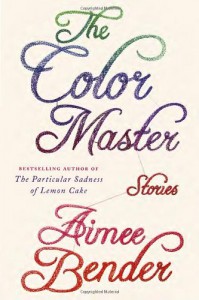 I am not very good at writing about short story collections, but this was pretty fantastic. I was wary of The Particular Sadness of Lemon Cake because it sounded a little too gimmicky for my tastes, but the buzz surrounding this collection is hard to ignore. It's also well-deserved. These stories are tinged with magical realism and overflowing with beautiful sentences and thoughtful observations. Highly recommended.
I am not very good at writing about short story collections, but this was pretty fantastic. I was wary of The Particular Sadness of Lemon Cake because it sounded a little too gimmicky for my tastes, but the buzz surrounding this collection is hard to ignore. It's also well-deserved. These stories are tinged with magical realism and overflowing with beautiful sentences and thoughtful observations. Highly recommended.
 What's that old saying, "If you don't have anything nice to say, better say nothing at all."
What's that old saying, "If you don't have anything nice to say, better say nothing at all." I'm not going to say anything here, except that the tone of this book just did not work for me.
 It’s 1989, the Berlin Wall is about to come down, and young ingenue Katie has been offered a once-in-a-lifetime opportunity as an assistant to a famous photographer in Paris. Drama and hi-jinks ensue.
It’s 1989, the Berlin Wall is about to come down, and young ingenue Katie has been offered a once-in-a-lifetime opportunity as an assistant to a famous photographer in Paris. Drama and hi-jinks ensue. The thing about asshole characters is that, in order for me to care about them and want to know what’s going to happen to them, I need to understand a little bit about why they’re assholes. Maybe they had a tough childhood, maybe they’ve had one too many broken hearts, maybe they’ve been diagnosed with cancer and see the meth business as the only way to make enough money to support their family. (Clearly I've been catching up on Breaking Bad all day)
Lydia and Clarence – Katie’s boss and her husband – are unpleasant people, but seem to have no reason to be unpleasant than because they’re wealthy, shallow people with a broad circle of acquaintances with Big Names. They treat each other poorly, they treat Katie poorly, and they treat their children poorly. Their daughter’s soon-to-be ex-boyfriend sums up the entire family when he decries “the sense of entitlement, the cluelessness, the assumption that her jet-set intellectual parents make her someone.”
They barely rise above stereotypes. They’re unlikable because they’re entitled and they’re entitled because they’re wealthy intellectuals. And that just wasn't interesting to me.
Katie is an extremely doe-eyed character who’s supposedly had to work hard for everything in her life (a fact for which I saw no real evidence aside from the fact that her father passed away when she was an adolescent). She’s so doe-eyed that she lets everyone around her make decisions for her and then refuses to take responsibility for her actions. I found her naivete-as-excuse-for-bad-choices frustrating and over-the-top.
And none of these characters seem to grow or change or evolve. It just didn’t work for me. I think Reyl is a promising writer, but her characters never rose above two dimensions for me. The plot was a little thin, too, not exploring any new ideas or surprising me in anyway. In a word? Predictable. Still, I seem to be in the minority around here so there may be something I'm missing.
 Celia is a widow who doesn't know how to really move on. Five years after her husband's death, she is the landlord of a small apartment building in Brooklyn. She is very picky about whom she chooses as tenants, because she very much wants to be left alone and not be forced to interact with anyone too much.
Celia is a widow who doesn't know how to really move on. Five years after her husband's death, she is the landlord of a small apartment building in Brooklyn. She is very picky about whom she chooses as tenants, because she very much wants to be left alone and not be forced to interact with anyone too much. Then one of her tenants has the opportunity to travel, but only if Celia will allow him to sublet his apartment for a few months to Hope. Celia finds herself intrigued with Hope and her desire to stay hidden behind walls is put to the test.
This book was...okay. At times. The characters never really came alive to me, staying very flat and never proving to me why I should care about them. In general, I'm not a big fan of the stream-of-conscious narration that Loyd uses and she was given to overwriting.
I felt the radiator in my bedroom, and when its heat did not feel emphatic enough, I pulled my sweater and jeans on, stuck my feet into slippers, and went to check the boiler.
The heat's not emphatic enough? You can't just say you were cold?
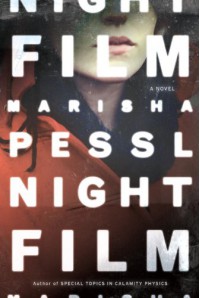 I grew up in the thirteenth most haunted place in the world. For reals, you guys: when I was in high school, Fox Family Channel filmed an episode of a show called Scariest Places on Earth (or something) there. I grew up next door to my mother's childhood home, which is included in the university library's "Hauntings" file due to things like creepy old ladies supposedly hanging out in the hallways and Native American burial mounds in the backyard.
I grew up in the thirteenth most haunted place in the world. For reals, you guys: when I was in high school, Fox Family Channel filmed an episode of a show called Scariest Places on Earth (or something) there. I grew up next door to my mother's childhood home, which is included in the university library's "Hauntings" file due to things like creepy old ladies supposedly hanging out in the hallways and Native American burial mounds in the backyard. Despite all of this, I have never been much of a horror fan. It's not so much that I don't like being scared as I often find supernatural plots kind of...well, silly. Even with aunts and uncles who swear by it, I've just never really believed in things like ghosts. The Ring, The Exorcist, Blair Witch -- these sorts of stories require me to suspend disbelief way beyond where I am normally willing to go.
Marisha Pessl, though, has taken the horror novel to a new level.
Pessl was a buzzy name seven years ago, when Special Topics in Calamity Physics was the most love-it-or-hate-it title of 2006. This book has been on the docket for at least two or three years now, so Marisha has built some lofty expectations to deal with.
This book is about a disgraced investigative journalist, Scott McGrath, looking into the death of Ashley Cordova, the daughter of legengary reclusive film director Stanislav Cordova. Cordova is the kind of filmmaker that makes Lars Von Trier look like a pansy, and his films are considered so dark and disturbing that the only way to see them is to track down a black market copy through an underground secret society of fans. Several years ago, Scott went from investigative journalist to disgraced investigative journalist by following up on a tip that something fishy was going on in Cordova's isolated estate in upstate New York only to be hit up with a slander lawsuit. When he hears that Ashley has apparently killed herself in an abandoned warehouse, he suspects there is more to the story than meets the eye.
Scott's investigation pairs him up with two troubled youths - Nora and Hopper - as they delve into the worlds of black magic, psychiatric institutions, and cultish legions in an attempt to find out what happened to Ashley. Pessl leaves almost no horror trope unturned and yet this story never feels cliche. It's creepy, dark, and twisty with clues folding out in fits and starts, their meanings changing with each turn of the page. Like House of Leaves, Pessl has woven her story with newspaper clippings and web screenshots, the various multimedia adding to the investigation and I was never really sure what was going to happen next.
There were a few small things that kept me from rating this book five stars. I didn't completely buy that Scott would be so willing to team up with two random twentysomethings, and there were times when I wanted Pessl to get to the point a little quicker. My biggest complaint with Special Topics was that Pessl kept adding twists to the plot long after it felt necessary and, to an extent, she's guilty of that here. Six hundred pages is a lot, and I honestly felt she could have trimmed out some of the various threads and long descriptions without losing too much meat.
Still, this is a superlative horror novel that will make you question a lot about the world you've found yourself in. Pessl has very much fulfilled those giant expectations.
 I started this when I received it from netgalley, and while I enjoyed the first twenty pages or so, I think I need to wait until I can get my hands on Piccirilli's first book in order to really appreciate it.
I started this when I received it from netgalley, and while I enjoyed the first twenty pages or so, I think I need to wait until I can get my hands on Piccirilli's first book in order to really appreciate it. I think it's going to be good, though.
 I didn't get very far into this one, but I need to review it for NetGalley. It's about a college freshman caught in a bit of a love triangle between a bad boy and her best friend. The writing was dull and the characters were little more than cliche.
I didn't get very far into this one, but I need to review it for NetGalley. It's about a college freshman caught in a bit of a love triangle between a bad boy and her best friend. The writing was dull and the characters were little more than cliche.
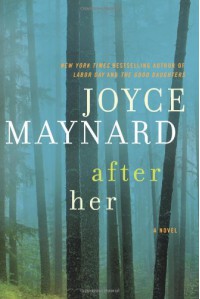 This is a coming of age tale set in San Francisco Bay area in the late seventies. Rachel and her younger sister Patty live near the mountains where a serial killer has begun to kill young women and leave their bodies behind. Their father is the detective in charge of the investigation. Maynard is a fine writer and the sisters are great characters, but she throws in a few plot twists that were just unbelievable enough to keep me from truly losing myself in the story.
This is a coming of age tale set in San Francisco Bay area in the late seventies. Rachel and her younger sister Patty live near the mountains where a serial killer has begun to kill young women and leave their bodies behind. Their father is the detective in charge of the investigation. Maynard is a fine writer and the sisters are great characters, but she throws in a few plot twists that were just unbelievable enough to keep me from truly losing myself in the story.
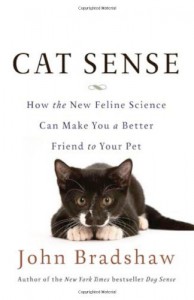 I play mama to the classiest cat there is:
I play mama to the classiest cat there is: 
She's also kind of a beast, forever reminding me that she's more important then the boyfriend:

Still, I love her to pieces and fret that she's gonna call child services on me when I have to leave her overnight. My hope was that learning a little kitty psychology will help soothe my guilt and get her to stop biting my butt. This book didn't give me as much straightforward information as I'd hoped.
Bradshaw spent a lot of time exploring the evolutionary history of the domestic cat -- most of which I honestly skimmed. He then offered some insight into how cats learn to socialize -- most of which I could have told you when I was nine, having grown up with a steady stream of feral cats hanging around the back yard. A lot of heavy scientific discussion to explain that cats aren't likely to be friendly unless they've been around people from a very early age.
I had hoped that maybe the book could be applied a little more directly to my cat's quirky behaviors, but I was rather disappointed.
 For this one, I think I'm just going to defer to the brilliant Jeanette, because her review says pretty much exactly what I'm thinking.
For this one, I think I'm just going to defer to the brilliant Jeanette, because her review says pretty much exactly what I'm thinking.


